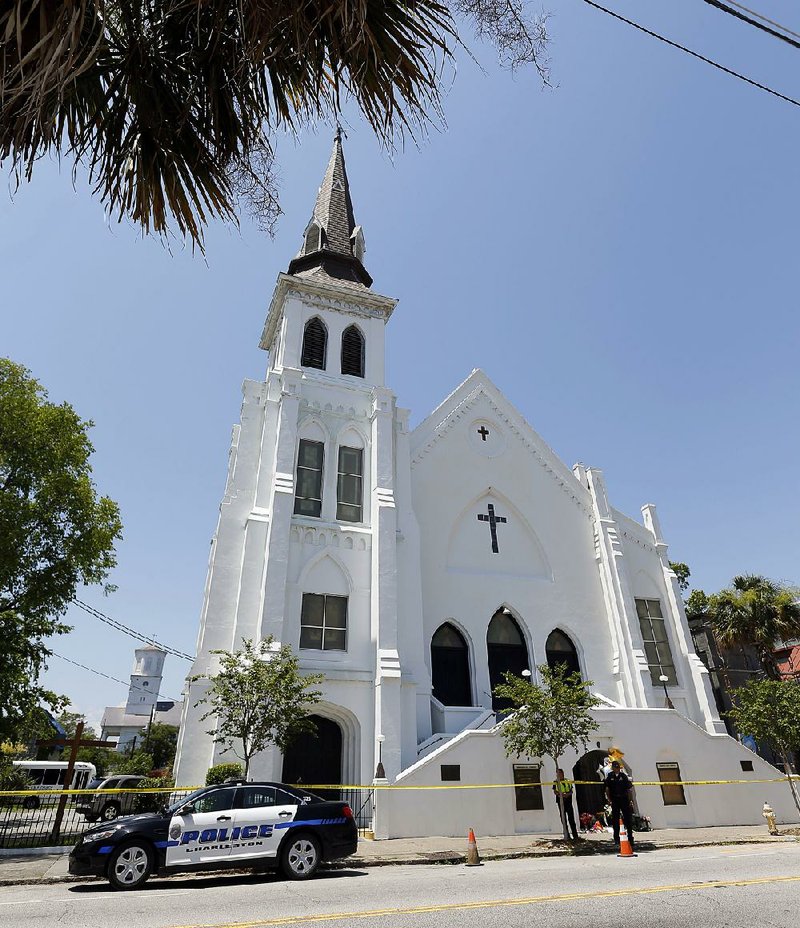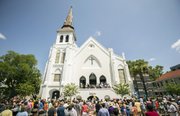The massacre at a black church in storied old Charleston, S.C., also known as the City of Churches and the Holy City, plunged it into the very heart of darkness. It also set off a cascade of comments across the country. Yet this whole back-and-forth, this all-consuming discussion all the time, left one commentator strangely unmoved, even uninvolved. Not for the first time, I felt completely out of it, as if the discussion were taking place on a different planet, and in a different language.
Everybody seemed to have an opinion to offer, but not a one engaged me, pro or con. Unlike the cry of defiance from Brother Norvel Goff, presiding elder of the AME church in South Carolina, when he flung open the doors of that now desecrated sanctuary to proclaim that "no demon in hell or on earth can close the doors of God's church!"
The black church, like the black family, may be only a shadow of its old self these days, but it can still be aroused in a moment of crisis--and roar like a lion. Even while all the sophisticates on the internet jabber away with more heat than light. I'm supposed to be interested in what they have to say, and even feel guilty when I'm not. But I wasn't. Why should that be?
Maybe it's because we're all products of our own backgrounds and experiences, and mine didn't relate. Let me begin by recalling a visit to Washington, D.C., sometime in the 1980s for some kind of conference, when I was impressed by the number of derelicts I had to crawl over as they tried to get a warm night's sleep on the sidewalk grates outside my hotel. It turned out they were de-institutionalized mental patients who had been handed a bottle of pills and told to self-medicate. Of course they didn't. Some of them were dangerous, many delusional. Others were just crazed fanatics uttering their hateful slogans in the dark of the night.
This isn't right, I thought. We're making a terrible mistake. No, more than a mistake. This is madness, literally. And we're giving it free run of our streets, sidewalks, schools, churches . . . . And will pay a terrible price. We did. And still do, as in Charleston.
Long before then, I had been writing editorials and columns for the old Pine Bluff Commercial wondering why any kind of civilization would so neglect its mentally ill-- by shutting down the very institutions that had been developed with such care and effort over the years to meet their needs. And society's. Not to mention all the other cast-offs who needed a place devoted to their care, like orphans, TB patients, the disabled and disoriented of all kinds . . . .
I'd written one piece after another objecting to such institutions being shut down. Or just disbanded, reorganized or even expanded beyond recognition, their whole character changed--the Methodist Children's home, the TB Sanitorium at Booneville, the Children's Colony at Conway . . . .
I came by my respect and gratitude for such institutions over many years and some personal experience with them. As a child, on visits to the family in Chicago, we would all pack into the car and go to a state-financed TB sanitorium in upstate Illinois to visit my Uncle Feivel (Philip), who was a patient there. He was quarantined not just to assure he wouldn't be a source of contagion to others but to be given--and take--his daily medications. Rather than being trusted to take them on his own, since many patients didn't when left to their own devices.
Even as a child, I was impressed by the wide, well-kept lawns, the nice, clean if antiseptic waiting rooms and library, the strict nurses and white-clad attendants. I played with the other children who were there to visit patients in their families. Now the whole place may be gone, or completely changed. Call it another sacrifice to the great god Progress.
In the endless debate over the whys and wherefores of massacres like the one in Charleston, we've been sidetracked time and again by red herrings--like the obsession with gun control--instead of keeping our eyes on the greater danger: the crazies themselves, where they are and what they're up to. Like mass homicide.
Yet politicians who feel they must say something on these recurrent occasions when innocent people are mowed down keep reciting their familiar mantra of root causes (Racism!) and pet remedies (Gun Control Now!). "Let's just cut to the chase," said Hillary Clinton, campaigning in Nevada on Thursday. "It's guns." Really? She wasn't offering a solution but just another distraction.
The root of the problem isn't guns but the killers who use them. Often enough to shoot up churches, schools, theaters . . . . Yes, we have legal remedies in place to take custody of such people while assuring that nobody is railroaded into an asylum for no good reason. Those remedies are far from perfect, and grave injustices may be done, but using the courts to confine such people is much better than losing track of them. And one bright day picking up the morning paper or turning on the radio and finding out just where they've been--and done.
Granted, there are no neat solutions to this challenge, but there are better approaches than the negligence we've fallen into. Why not try due process instead of barking up all those wrong trees?
But beyond all that, undergirding all the glib assumptions our society swallows without thinking, there is the all-permeating, thoroughly secularized spirit of the age. That godless approach to every issue strikes me as unrealistic, misdirected from the first and maybe till last. It is behind the assumption that this murderous attack in Charleston was about race, and only race. Even if it was an attack on a church, a holy place, and not the local NAACP office. Or a federal courthouse like the one in Oklahoma City that a mass killer like Timothy McVeigh blew up in one of the crimes of the century.
What's more, this was a black church, where the traditional call-and-response of worshippers may be the closest our age comes to the sound and spirit of the ancient Psalms. Note well: This was an attack not on some government agency but on Corpus Christi, the very body of Christ. Its roots were not in any social, cultural, political or racial issue but a religious one, even if the killer thought he was doing God's will. It wouldn't be the first time man confused God's will with his own.
A black preacher named Martin Luther King Jr. would address any number of secular issues in his time--the war in Vietnam, civil rights, poverty--and did. But he understood that his power as an orator and leader was not his own; it sprang, always, from a greater Power, from Scripture, not just from his eloquent words but from the Word itself. And he never ceased to rely on it.
Maybe I'm wrong (yes, it's been known to happen), and this bloody sacrilege in Charleston was really all about race or some mix of other social and political issues that have nothing to do with God's word, but my soul tells me different. And if I'm right, how would that differ from what witnesses to God's truth have been told to expect in this world--the persecution that disciples of Christ were told to anticipate, the lashes and stripes that have always awaited the body of Christ?
That's about the best I can do to explain my indifference to this whole, voluminous debate, when it may be the debate itself that is indifferent to what is real. And everlasting--like Good and Evil.
Much as we refuse to recognize his existence, Satan still goes "to and fro in the earth, walking up and down in it," seeing what evil he can inspire. And one Wednesday he walks into a black church in storied old Charleston, S.C., also known as the City of Churches, the Holy City . . . .
Paul Greenberg is editorial page editor of the Arkansas Democrat-Gazette. E-mail him at:
pgreenberg@arkansasonline.com
Editorial on 06/28/2015

